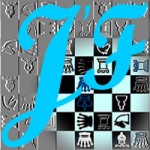|
No.925, 926 |
Original Problems, Julia’s Fairies – 2015 (II): July – December →Previous ; →Next ; →List 2015(II) Please send your original fairy problems to: julia@juliasfairies.com |
No.925, 926 by Erich Bartel – Three fairy conditions and surprising finals in two serial problems. (JV)
Definitions:
Chameleon Chess: All pieces on the board which are displayed as orthodox Q, R, B, S, are Chameleons (On completing a move, a Chameleon (from classical standard type) changes into another piece, in the sequence Q-S-B-R-Q… Promotion may be to a chameleon at any stage in the cycle.). A Pawn can promote only in Chameleon-pieces.
Alphabetic Chess: The squares are considered in the order a1, a2…a8, b1…b8, c1 and so on to h8. At each turn, only the unit standing on the square which comes earliest in this order may move. However check and mate are normal.
Disparate PY: If one side makes a move with a piece of type “x” (black, white, neutral, half-neutral, etc., King included), the other side cannot answer immediately by moving a piece of the same type “x”. (For example: white Qc1, black Ka8,Qa7 – mate in 1 move. After 1.Qc8#, Black is mated because 1…Qb8? is illegal. The mate is possible also with the neutral nQc1 – after 1.nQc8#. Black cannot move the same neutral Queen.) Every Pawn’s promotion is a Pawn’s move, therefore after such promotion (into any possible piece) the other side cannot answer immediately with its Pawn. We can say that after the move of the figure of type “x” any enemy figure of type “x” falls under Half-moving paralysis. This paralysis disappears immediately on the next half-move, if the opponent plays with another piece of type “y”. (“Disparate PY” is implemented as “Disparate” till the latest version of Popeye, PY 4.73. In WinChloe this version of Disparate is available starting version 3.32.)
Madrasi: Units, other than Kings, are paralysed when they attack each other. Paralysed units cannot move, capture or give check, their only power being that of causing paralysis.
Madrasi RI (rex inclusive): the rule applies to Kings as well, so the two Kings may stand next to each other.
|
No.925 Erich Bartel |
Solution: (click to show/hide) |
|
white Bb6 Pa7 Kb7
black Qa1 Ba2 Ka3 Sa4 Ra5
ser-s=6 2 solutions (3+5) |
|
|
|
|
|
No.926 Erich Bartel |
Solutions: (click to show/hide) |
|
white Ke4 Pa7b7c7d7e7
black Kc1 Sa3 Bb3 Rc3 Qd3 Bb5
ser-==10 (6+6) |
|



ad 925)
http://pdb.dieschwalbe.de/search.jsp?expression=PROBID=%27P1310606%27
ad 926)
http://pdb.dieschwalbe.de/search.jsp?expression=PROBID=%27P1310607%27
Dear Bartel,
In 926, how can the 1st move be d8=Q? Is it not that P at a7 should move first?
White king is under check. Pd7 is the first piece that may defend
Oh, God! Silly of me not to see the Madrasi condition!